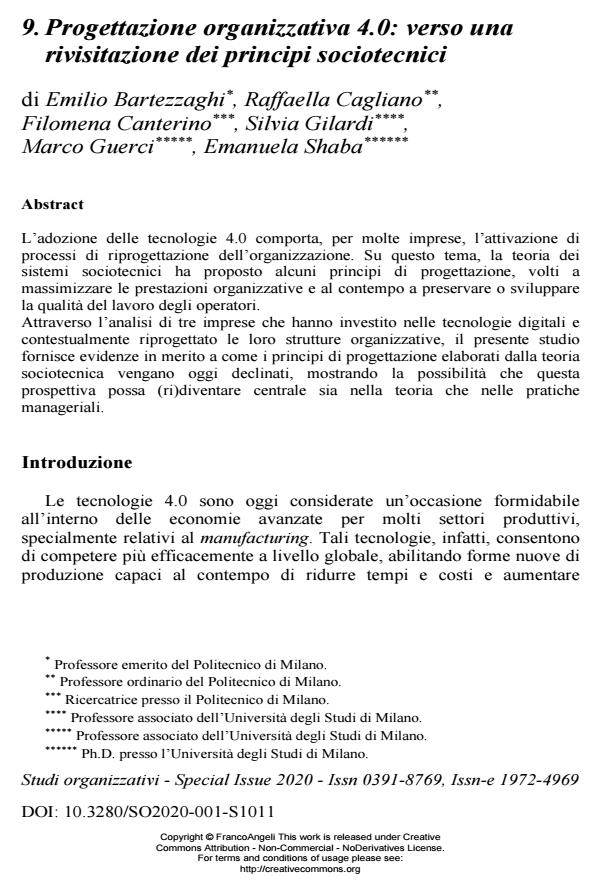Progettazione organizzativa 4.0: verso una rivisitazione dei principi sociotecnici
Journal title STUDI ORGANIZZATIVI
Author/s Emilio Bartezzaghi, Raffaella Cagliano, Filomena Canterino, Silvia Gilardi, Marco Guerci, Emanuela Shaba
Publishing Year 2020 Issue 2020/suppl. 1
Language Italian Pages 28 P. 179-206 File size 304 KB
DOI 10.3280/SO2020-001-S1011
DOI is like a bar code for intellectual property: to have more infomation
click here

FrancoAngeli is member of Publishers International Linking Association, Inc (PILA), a not-for-profit association which run the CrossRef service enabling links to and from online scholarly content.
L’adozione delle tecnologie 4.0 comporta, per molte imprese, l’attivazione di processi di riprogettazione dell’organizzazione. Su questo tema, la teoria dei sistemi sociotecnici ha proposto alcuni principi di progettazione, volti a massimizzare le prestazioni organizzative e al contempo a preservare o sviluppare la qualità del lavoro degli operatori. Attraverso l’analisi di tre imprese che hanno investito nelle tecnologie digitali e contestualmente riprogettato le loro strutture organizzative, il presente studio fornisce evidenze in merito a come i principi di progettazione elaborati dalla teoria sociotecnica vengano oggi declinati, mostrando la possibilità che questa prospettiva possa (ri)diventare centrale sia nella teoria che nelle pratiche manageriali.
- Bailey D., Faraj S., Hinds P., von Krogh G., Leonardi P. (2019). “Special Issue of Organization Science: Emerging Technologies and Organizing”. Organization Science, 30(3): 642-646.
- Bartezzaghi E. (2020). “Tecnologia, organizzazione e lavoro nella trasformazione digitale”. Lectio Magistralis, Politecnico di Milano. -- https://www.youtube.com/watch?v=nPWJXNqfEvI&feature=youtu.be
- Brynjolfsson E., McAfee A. (2014). The Second Machine Age. New York: W. W. Norton & Company.
- Butera, F. (2020). Organizzazione e società. Innovare le organizzazioni per l’Italia che vogliamo. Venezia: Marsilio.
- Butera F., Di Martino V., Koehler E., (1990). Technological development and the improvement of living and working conditions. London and Bruxelles: Kogan Page & EEC Official Publications.
- Butera F., De Witt G. (2011). Valorizzare il lavoro e sviluppare l’impresa. La storia delle “isole” della Olivetti nella rivoluzione dalla meccanica all’elettronica. Bologna: Il Mulino.
- Cagliano R., Canterino F., Longoni A., Bartezzaghi E. (2019). “The Interplay Between Smart Manufacturing Technologies and Work Organization”. International Journal of Operations & Production Management, 39(6): 913-934.
- Cherns A. (1987). “Principles of Sociotechnical Design Revisited”. Human relations, 40(3): 153-161.
- Davis L.E. (1988). “Joint Design of Organizations and Advanced Technology”. International Conference on Joint Design of Technology, Organization and People Growth, Venice, October 12-14.
- Davis J., Edgar T., Porter J., Bernaden J., Sarli M. (2012). “Smart Manufacturing, Manufacturing Intelligence and Demand-dynamic Performance”. Computers and Chemical Engineering, 47(1): 145-156.
- Dubois A., wanGadde L.E. (2002). Systematic combining: An abductive approach to case research. Journal of Business Research, 55: 553–560.
- Frey C.B., Osborne, M.A. (2017). “The Future of Employment: How Susceptible are Jobs to Computerisation?”. Technological Forecasting and Social Change, 114: 254–80.
- Hirsch-Kreinsen H. (2016). “Digitization of industrial work: development paths and prospects”. Journal for Labour Market Research, 49 (1): 1-14.
- Kumar V., Whitney P. (2003). “Faster, Deeper User Research”. Design Management Journal, 14(2): 50 -55.
- Kusiak A. (2018). “Smart Manufacturing”. International Journal of Production Research, 56 (1-2): 508-517.
- Parker S., Grote G. (2019). “Automation, Algorithms, and Beyond: Why Work Design Matters More Than Ever in a Digital World. Applied Psychology, https://doi.org/10.1111/apps.12241.
- Pasmore W., Winby S., Mohrman S.A., Vanasse R. (2019). “Reflections: Sociotechnical Systems Design and Organization Change”. Journal of Change Management, 19(2): 67-85.
- Shaba E., Guerci M., Gilardi S., Bartezzaghi E. (2019). “Industry 4.0 Technologies And Organizational Design-evidence from 15 Italian Cases”. Studi Organizzativi, 1: 9-37.
- Trist E.L. (1981). The sociotechnical perspective. The evolution of sociotechnical systems as a conceptual framework and as an action research program. In: Van de Ven A.H., Joyce W.F. (eds.), Perspectives on Organization Design and Behavior. New York: Wiley, pp. 19-75.
- Trist E.L., Higgin G.W., Murray H., Pollock A.B. (1963). Organizational Choice. London: Tavistock Publications.
- Trist E.L., Murray H., (eds.) (1993). The Social Engagement of Social Science, a Tavistock Anthology, Volume 2: The Sociotechnical Perspective. Philadelphia: University of Pennsylvania Press.
- Wang S., Wan J., Zhang D., Li D., Zhang C. (2016). “Towards Smart Factory for Industry 4.0: A Self-Organized Multi-Agent System with Big Data Based Feedback and Coordination”. Computer Networks, 101 (1): 158-168.
- New trajectories in workplace cooperation: managers, employees and unions for the evolution of contemporary organizations Andrea Signoretti, Manuela Galetto, Mimmo Carrieri, Edoardo Della Torre, in STUDI ORGANIZZATIVI 1/2022 pp.7
DOI: 10.3280/SO2022-001001 - Remote work in the pandemic as a lever for innovation and worker participation practices Luisella Erlicher, Luciano Pero, in STUDI ORGANIZZATIVI 1/2022 pp.154
DOI: 10.3280/SO2022-001007 - Innovating the management of corporate crises with new forms of participation of trade union representatives and workers Luigi Campagna, Luciano Pero, in STUDI ORGANIZZATIVI 1/2022 pp.108
DOI: 10.3280/SO2022-001005
Emilio Bartezzaghi, Raffaella Cagliano, Filomena Canterino, Silvia Gilardi, Marco Guerci, Emanuela Shaba, Progettazione organizzativa 4.0: verso una rivisitazione dei principi sociotecnici in "STUDI ORGANIZZATIVI " suppl. 1/2020, pp 179-206, DOI: 10.3280/SO2020-001-S1011